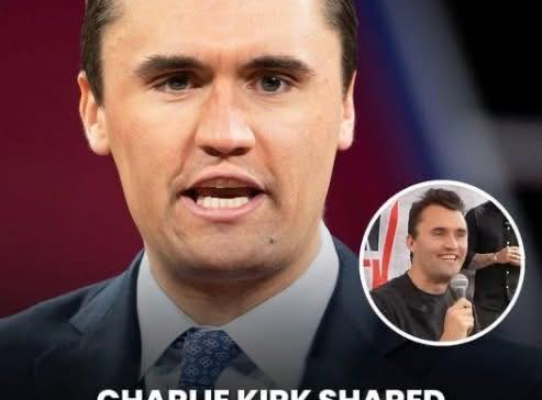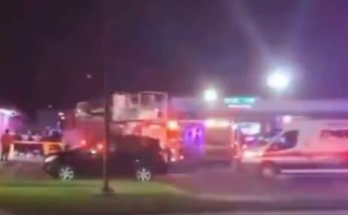
“America Will Never Be the Same”: The Haunting Final Post of Charlie Kirk
In the hours before his assassination at Utah Valley University, Charlie Kirk—conservative activist, founder of Turning Point USA, and one of the most polarizing voices in American politics—shared a final post that now feels like a premonition. It was chilling, direct, and emotionally loaded. And in the wake of his death, it’s sending shockwaves across social media, sparking speculation, heartbreak, and urgent questions about what really happened in the hours before that message appeared online.
The post, shared on both X and Instagram, featured a photo of Iryna Zarutska, a 23-year-old Ukrainian refugee who had fled war only to be brutally murdered on a train in Charlotte, North Carolina. Above her image, Kirk wrote: “America will never be the same”.
A Message That Echoes
At first glance, the post seemed like another entry in Kirk’s long-standing critique of crime, immigration, and political accountability. But in hindsight, it reads like something more—a warning, a lament, perhaps even a coded farewell. The timing was uncanny. Just hours later, Kirk would be shot in the neck while speaking to a crowd of 3,000 students, collapsing in front of a stunned audience during his “American Comeback Tour.”
The juxtaposition was too stark to ignore. Zarutska had been stabbed in the neck. Kirk was shot in the neck. Both were public figures in their own way—one a victim of senseless violence, the other a victim of political assassination. The eerie symmetry has led many to believe that Kirk’s final post was more than commentary. It was prophecy.
The Crime That Sparked the Post
Zarutska’s murder was horrifying. Surveillance footage showed her seated quietly on public transit when DeCarlos Brown Jr., a man with 14 prior offenses, slit her throat without provocation. Kirk’s post was a direct response to this crime, and it carried a message of urgency:
“If we want things to change, it’s 100% necessary to politicize the senseless murder of Iryna Zarutska because it was politics that allowed a savage monster with 14 priors to be free on the streets to kill her,” Kirk wrote.
He went on to say that while he disliked politicizing tragedy, this case demanded it. He pointed out the racial dynamics, noting that the attacker had reportedly said, “I got that white girl.” Kirk argued that if the racial roles had been reversed, the media would have erupted in outrage and policy reform.
It was a post that blended grief, anger, and political fire—a signature Kirk cocktail. But now, it’s being read through a different lens.
The Speculation Begins
In the hours after Kirk’s death, social media lit up with theories. Was his post a signal that he knew something was coming? Had he received threats? Was he trying to warn his followers?
Some pointed to the phrase “America will never be the same” as a veiled goodbye. Others saw it as a rallying cry, a call to arms against what Kirk viewed as systemic failures. And a few wondered whether the post itself had provoked the assassin—22-year-old Tyler Robinson, who was later arrested after being turned in by his father.
Robinson’s motives appear to be ideological. Bullet casings found at the scene were inscribed with phrases like “Hey fascist! Catch!” and “Bella Ciao,” an anti-fascist anthem. Kirk’s final post, with its unapologetic tone and political charge, may have been the last straw for a man already radicalized.
A Public Persona Reconsidered
Kirk was known for his brash style, his unwavering support of President Donald Trump, and his ability to galvanize young conservatives. But his final post revealed something deeper: a man grappling with the consequences of violence, injustice, and political decay.
He didn’t just condemn the crime—he dissected it. He didn’t just mourn the victim—he demanded accountability. And in doing so, he exposed a vulnerability that many hadn’t seen before.
For some, the post has changed how they view Kirk. It wasn’t just another partisan jab. It was a moment of raw clarity, a glimpse into the emotional toll of the issues he championed. It showed a man who, despite his reputation for provocation, was deeply affected by the suffering of others.
The Ripple Effect
The post has since gone viral. Thousands have shared it, commented on it, and memorialized it. Supporters see it as prophetic. Critics see it as inflammatory. But everyone agrees—it’s haunting.
In the days following his death, tributes poured in. President Trump called Kirk “a patriot, a fighter, and a dear friend”. The New York Yankees displayed his image on their jumbotron with the words “Remembering Charlie Kirk”. His wife Erika shared a Bible verse: “God is our refuge and strength, a very present help in trouble”.
And through it all, Kirk’s final post remained at the center of the conversation—a digital echo of a voice silenced too soon.
What Really Happened?
The hours before Kirk’s death are still being pieced together. He had appeared on FOX News days earlier, discussing the “Gen Z Gender Divide” and advocating for family over career. He had spoken about declining birth rates, shifting cultural priorities, and the role of faith in shaping young lives.
Then came the post about Zarutska. Then came the event at Utah Valley University. Then came the bullet.
Was it coincidence? Was it fate? Was it the culmination of years of political tension?
We may never know for sure. But the sequence of events has left a nation reeling.
Conclusion: A Post That Changed Everything
Charlie Kirk’s final post wasn’t just a reaction to a crime. It was a mirror held up to America’s soul. It reflected our fears, our divisions, and our desperate need for justice. It was bold, unsettling, and heartbreakingly prescient.
In death, Kirk’s words have taken on new weight. They’ve sparked reflection, debate, and a renewed urgency to confront the issues he cared about. And for many, they’ve changed everything we thought we knew about his public persona.
He was more than a provocateur. He was a man who saw the cracks in the system—and tried to warn us before it was too late.


